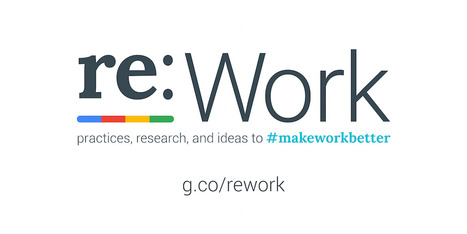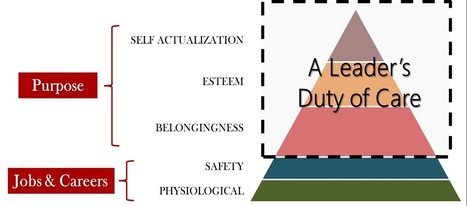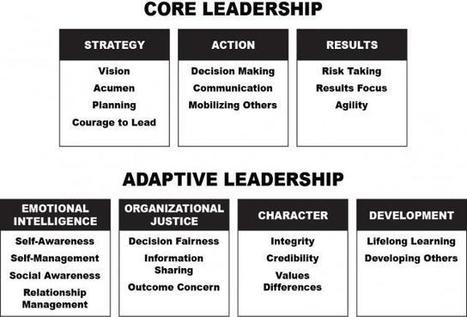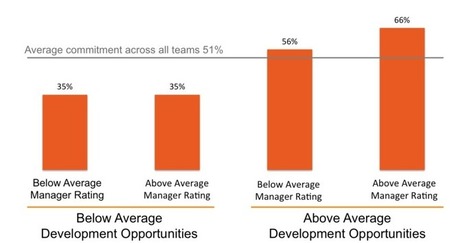 Your new post is loading...
 Your new post is loading...

|
Scooped by
Andrew Gerkens
October 16, 2017 1:49 AM
|
The general manager of people and culture at Australia’s Origin Energy explains why it’s important to go beyond top-down objectives and targets.

|
Scooped by
Andrew Gerkens
August 23, 2017 10:52 PM
|
Growing and training managers, with the help of Google's training workshop, can help build a culture of great management.

|
Scooped by
Andrew Gerkens
July 17, 2017 10:54 PM
|
Understanding other people's perspectives and feelings is anything but "soft," writes emotional intelligence expert Daniel Goleman.

|
Scooped by
Andrew Gerkens
April 19, 2017 3:39 AM
|
While you can't simply copy down notes on how to practice leadership, these skills can be developed. Reflecting on how you define and approach problems is a good place to start.

|
Scooped by
Andrew Gerkens
March 10, 2017 1:51 AM
|
Acknowledge how people are feeling.

|
Scooped by
Andrew Gerkens
March 10, 2017 1:45 AM
|
Dealing with unpredictability requires what one Harvard psychologist has called a “self-transforming mind.” Here’s how to develop one.

|
Scooped by
Andrew Gerkens
January 8, 2017 5:14 PM
|
The Human Organization is an emerging model of collaboration that integrates a rigorous approach to creating outcomes (hard disciplines) with an equally rigorous approach to designing and innovating human experience (soft disciplines).

|
Scooped by
Andrew Gerkens
July 3, 2016 8:47 PM
|
The concept of leadership is shifting away from the individual towards a collective of individuals working in concert to advance an organization’s goals.

|
Scooped by
Andrew Gerkens
February 18, 2016 9:08 PM
|
It's really easy--and extremely effective.

|
Scooped by
Andrew Gerkens
January 28, 2016 8:31 PM
|
To have purpose in one’s work is to achieve what we might coin “workplace actualization”. You may be familiar with Abraham Maslow’s “Hierarchy of Needs,” where at the top of society’s (arguably) mo…

|
Scooped by
Andrew Gerkens
January 18, 2016 10:31 PM
|
Most of us have heard time and time again that "people don't leave companies, they leave managers". I can't recall ever seeing any compelling evidence for this. In our upcoming 2016 New Tech benchmark

|
Scooped by
Andrew Gerkens
September 25, 2015 3:48 AM
|
Building trust, building a team, building a network.

|
Scooped by
Andrew Gerkens
September 14, 2015 9:58 PM
|
|

|
Scooped by
Andrew Gerkens
October 9, 2017 10:54 PM
|
Here’s what agile leadership teams do differently.

|
Scooped by
Andrew Gerkens
August 3, 2017 2:34 AM
|
If you imagine a company as a house, envision the typical departments occupying various rooms throughout the house. Perhaps human resources is in the foyer, operations in the basement, product development in the kitchen, and so forth. In this analogy, the traditional role of marketing has been to create a winsome awning and a fine …

|
Scooped by
Andrew Gerkens
April 21, 2017 3:02 AM
|
One study, 23,000 employees, 45 countries. The results? Priceless.

|
Scooped by
Andrew Gerkens
April 12, 2017 2:05 AM
|
Unprecedented 21st century leadership challenges can not be addressed by a 20th century management toolkit

|
Scooped by
Andrew Gerkens
March 10, 2017 1:46 AM
|
One of the most popular Dilbert comic strips in the cartoon’s history begins with Dilbert’s boss relaying senior leadership’s explanation for the company’s low profits. In response to his boss, Dilbert asks incredulously, “So they’re saying that profits went up because of great leadership and down because of a weak [...]

|
Scooped by
Andrew Gerkens
January 30, 2017 6:42 PM
|
Developing future leaders isn’t just about putting them through programs. New research points to the critical importance of supporting them with the right organizational context—a workplace environment that encourages knowledge-sharing, risk-taking, and growth.

|
Scooped by
Andrew Gerkens
November 24, 2016 9:50 PM
|
One of my favorite quotes is: “For every complex problem there is an answer that is clear, simple, and wrong”- H. L. Mencken. So much of what we consider settled wisdom is actually a case of enough…

|
Scooped by
Andrew Gerkens
May 6, 2016 2:13 AM
|
Most company leadership development programmes are outdated, analogue, and
not fit for the digital workplace. They might use fancy LMS systems and
incorporate all kinds of excellent experiential learning methods. They
might also incorporate some famous academics (apart from company ego, I
still don't understand this) and have a social/peer learning element. But
in essence they are the same old programmes that we're seen for the past
two or three decades. And - guess what? - nothing changes.
To be a leader you've got to be:
* Authentic - check.
* Situational - OK.
* Accountable - yep, got that.
* Transparent - well, I'll try.
* Good at simplifying - yes, well, that's not going to happen at XCo..
* A good listener - now, I don't have time for that too.
* And whatever our company believes is important too - I'm tired.
And when you're finish the programme, you head back to work and try to be a
better leader. But then the work gets in the way, the reward and promotion
processes act as disencentives, and only some of it sticks...maybe.
ROI? Well, the industry is worth billions to providers. But I'm not sure
about value to those paying for either external solutions or in-house
development.
There are two problems I see every day:
First: leadership development does not incorporate actual work. It is side
of the desk stuff. The people delivering the programmes usually have no
experience in the business. They have an intrerest in leadership and are
experts in the theories (or at least folk tales of leadership).
But second and most important: leadership development programmes don't use
the tools a company already has for work. It adds more tools - sometimes
really fancy ones. But it doesn't, for example, show you how to collaborate
on a document with your team, to hold open meetings on a video call, or to
build your value networks using social media.
It's the second problem that I see as most critical. The new digital tools
that are arriving in the workplace require the behaviours I listed earlier.
Then, they can scale the behaviours to a wide audience. I can't emphasise
enough that the tech itself does nothing and changes nothing. It can only
scale what we already do.
I truly believe that helping a manager get comfortable and successful using
digital tools would be far more effective than most leadership programmes.
For example, working with their team using Skype, Yammer and O365. Or
Google Docs and Hangouts. Or see my previous post on how an ESN is a great
social media practice ground for execs. In all situations, collaborative
behaviours and skills are best learned by collaborating.
If we want our companies to be innovative, creative, and agile (or the
buzzword of the week) this is what needs to happen. This is the new change
"management". It's also scalable and more able to adapt to circumstance.
Get potential leaders using the tools, acting in a way that makes them
effective, and delivering measurable value. Or, even better, coach those
who are already using the tools effectively because they are your real
future leaders. After all, no analogue leadership programme deals with
#DigitalCultureShock.
I've been interesting in digital leadership ever since I used to sit in an
office, writing "leadership programmes". I was excited to learn about the
research and methods to develop "leaders" but was disappointed to feel that
the programmes didn't bring the value I was expecting. I believe was
because they were not tied to the immediate work people needed to actually
do or the systems they used to do it.
There have been a lot of interesting pieces on Digital Leadership skills
recently - like this one. Or anything written by Harold Jarche. Writers on
the new wave of leadership talk about people adept at human skills and
bringing the best out in others - using digital tools to expand their
influence (in a positive way) and opening new spaces for others to excel.
Current leadership development does nothing of the sort.

|
Scooped by
Andrew Gerkens
February 15, 2016 5:20 PM
|
Companies can tap their natural advantage when they focus on changing a few important behaviors, enlist informal leaders, and harness the power of employees’ emotions.

|
Scooped by
Andrew Gerkens
January 28, 2016 8:24 PM
|

|
Scooped by
Andrew Gerkens
December 1, 2015 11:05 PM
|

|
Scooped by
Andrew Gerkens
September 22, 2015 4:03 AM
|
The management of talent and human capital remains critical as a means to sustaining business performance. So, in a fast changing, technology-enabled
|
 Your new post is loading...
Your new post is loading...
 Your new post is loading...
Your new post is loading...






























A useful case study, not just in terms of the diversity focus and outcomes, but in the crowd-sourced and collaborative approach to the project and the change. What a wonderful way to engage and challenge a group of people who have a genuine desire to contribute and lead change.